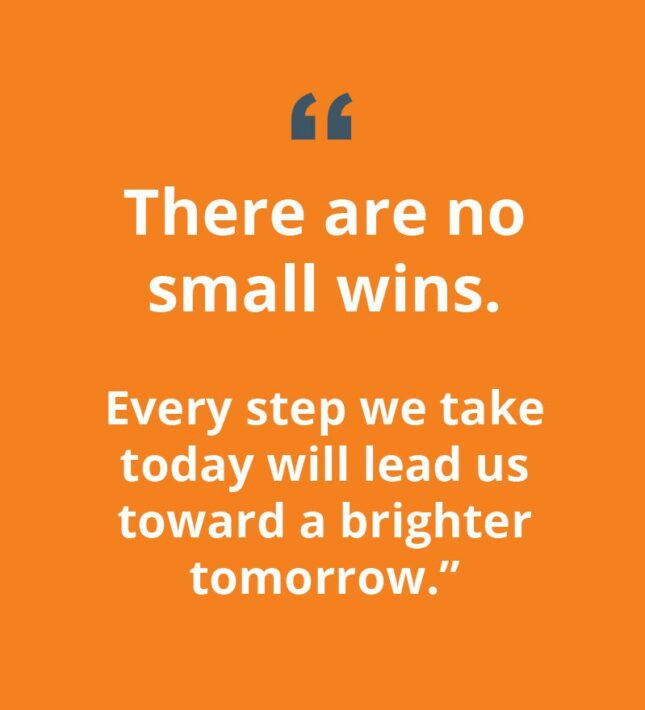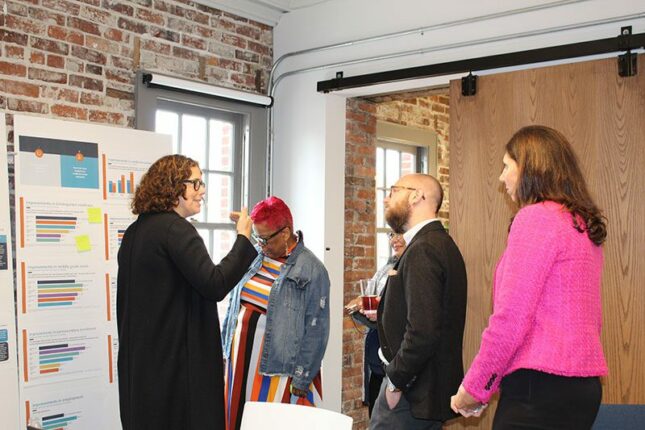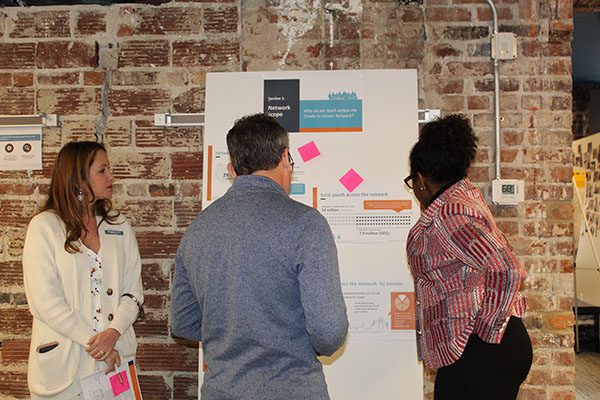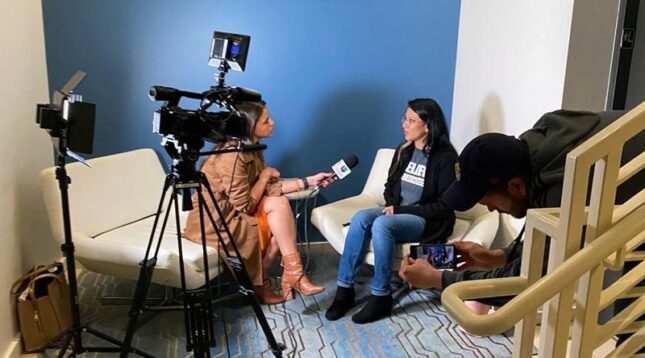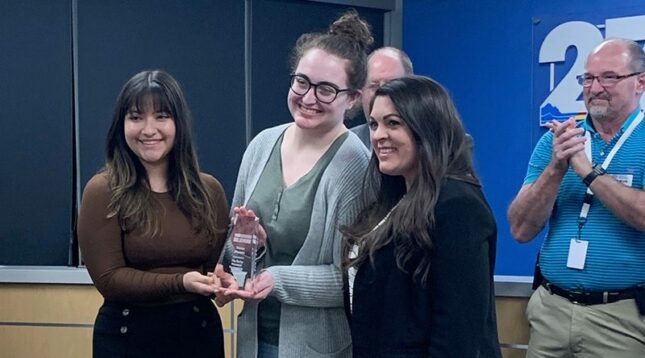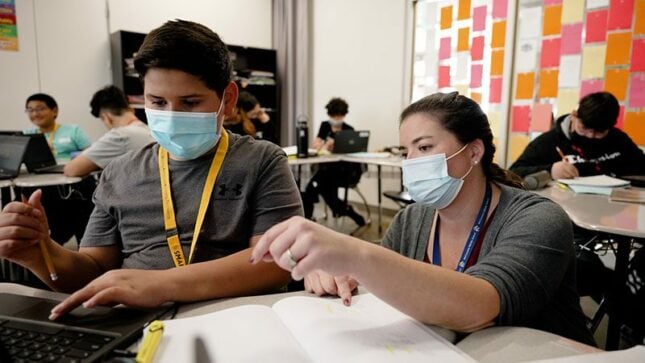2022 Annual Report
LETTER FROM
President & CEO and Board Chair
To our partners,Your commitment to this work is improving cradle-to-career outcomes and creating transformative change for youth and families on the road to economic mobility. Reflecting on 2022, we see results that indicate community investment in civic infrastructure promoted faster pandemic recovery, leading to better and more equitable outcomes across the country.
We know the pandemic had lasting effects on learning and deepened disparities, creating more challenges for Black, Indigenous, Latine and Asian children and children experiencing poverty. We also saw that connecting people, ideas and resources allowed StriveTogether Cradle to Career Network communities to maintain or surpass outcomes from before the pandemic. It’s important to take a moment to celebrate our progress.
We are inspired to witness the Network’s impact spreading beyond the boundaries of each local success story. Results fuel our momentum to make this work the essence of how we do things as a country. The stories featured in this report give us reason to believe.
In Colorado, a youth-led coalition rallied community support to pass an unprecedented levy to provide funding for a local school district. In Texas, collaboration and the use of data are transforming education systems. And across the country, the StriveTogether Theory of ActionTM guides communities as they build civic infrastructure to create lasting change on all levels — from neighborhood to national.
There is always more work to be done. Here at StriveTogether, we are sharing more than a decade of experience in supporting systems transformation within communities. We’re committed to spreading what works to others working to advance economic mobility.
As you explore our annual report, we encourage you to share our momentum and insights. You can learn more at StriveTogether.org.
There are no small wins. Every step we take today will lead us toward a brighter tomorrow. Thank you for helping us build a future where every child has every chance to succeed.
In partnership,
Jennifer Blatz
President & CEO, StriveTogether
Russell W. Booker, Ph.D.
Board Chair, StriveTogether
2022
Network by the Numbers
Civic Infrastructure Assessment Data
The following data is shared by the Cradle to Career Network during the annual civic infrastructure assessment, which measures progress along the StriveTogether Theory of ActionTM. Network members use data to inform decisions, refine strategies, target resources and track progress.
The effects of the COVID-19 pandemic continue to present challenges in data collection and analysis, including missing data and lags in reporting.
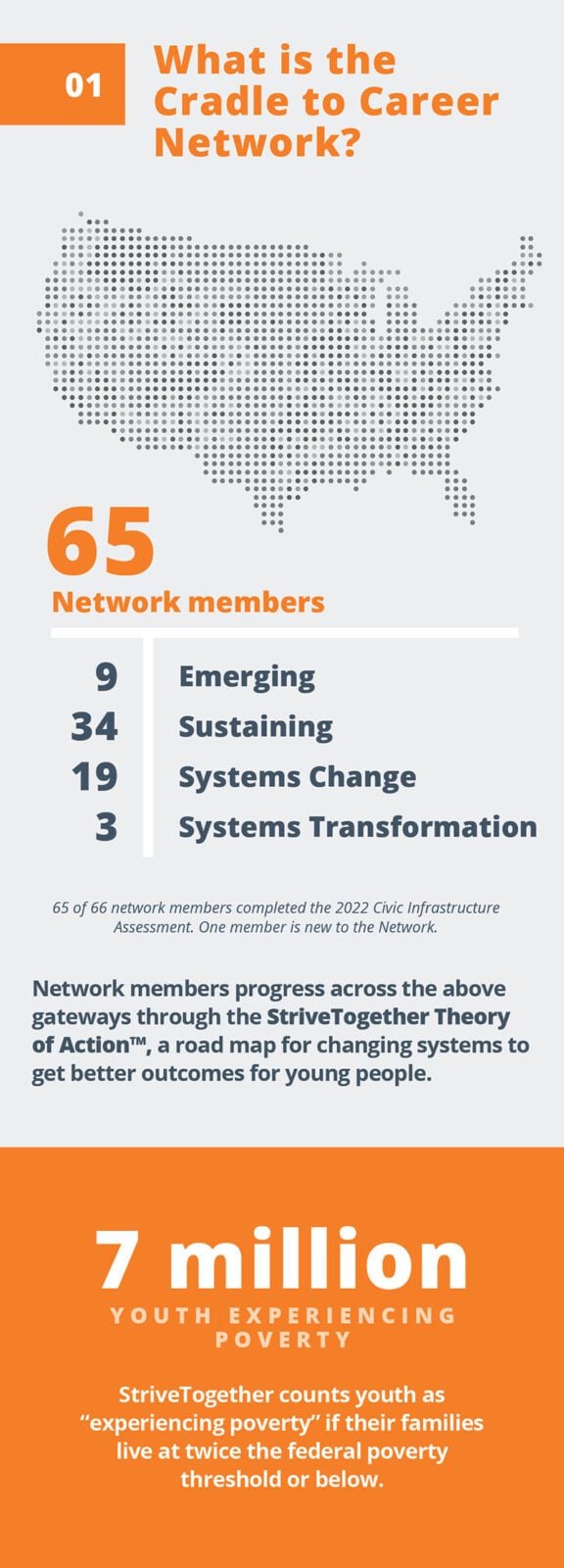
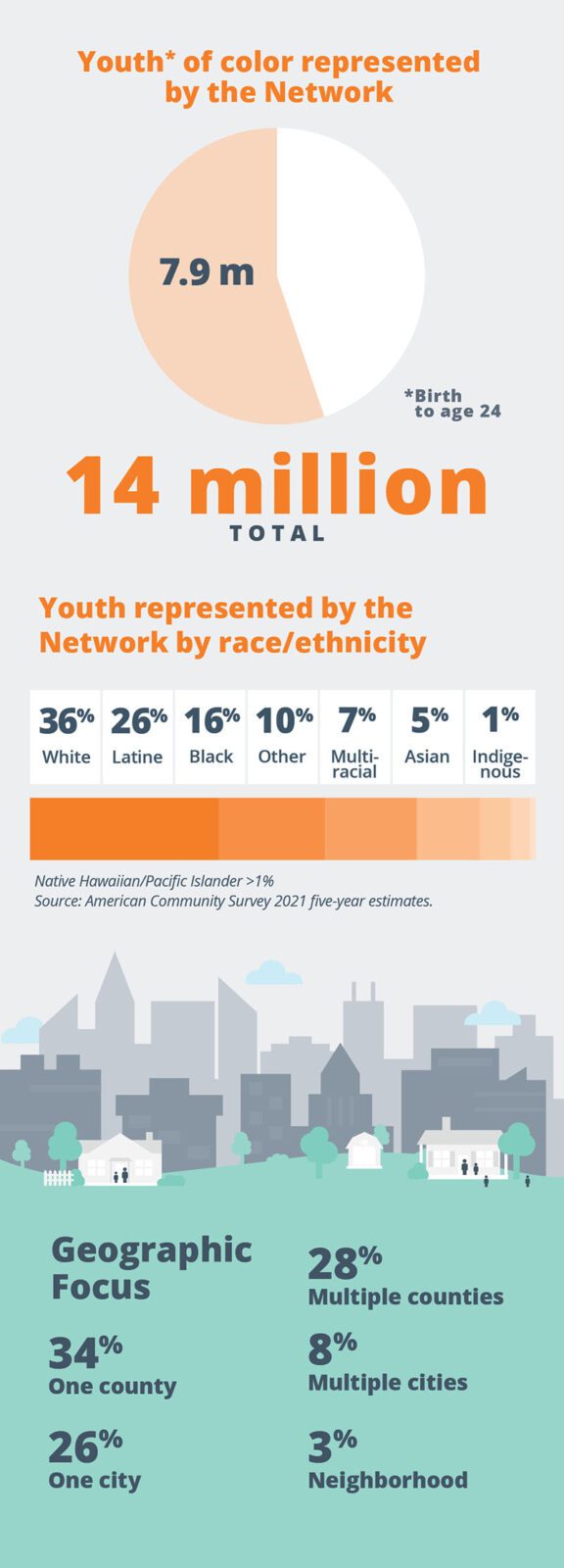
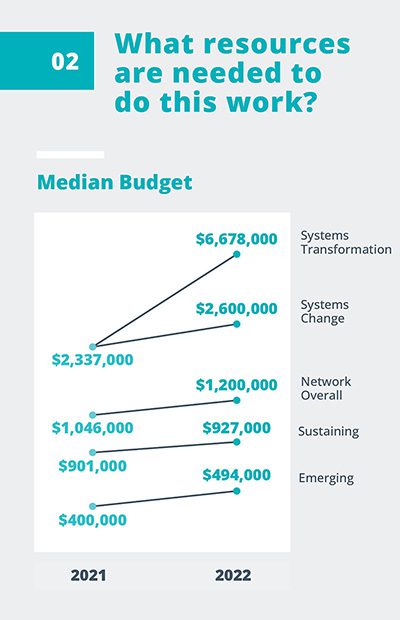
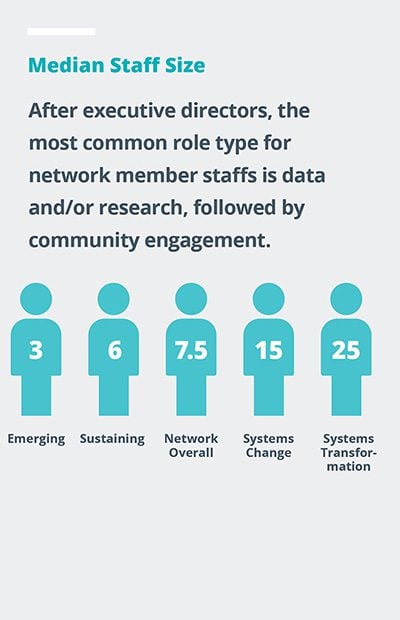
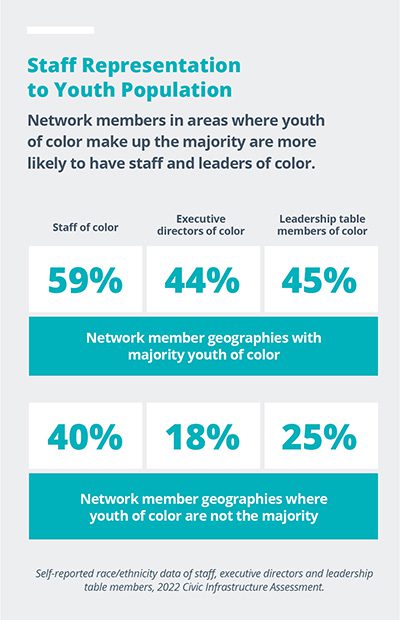
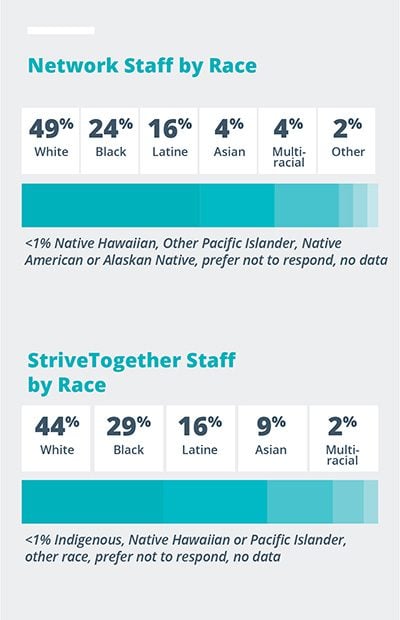
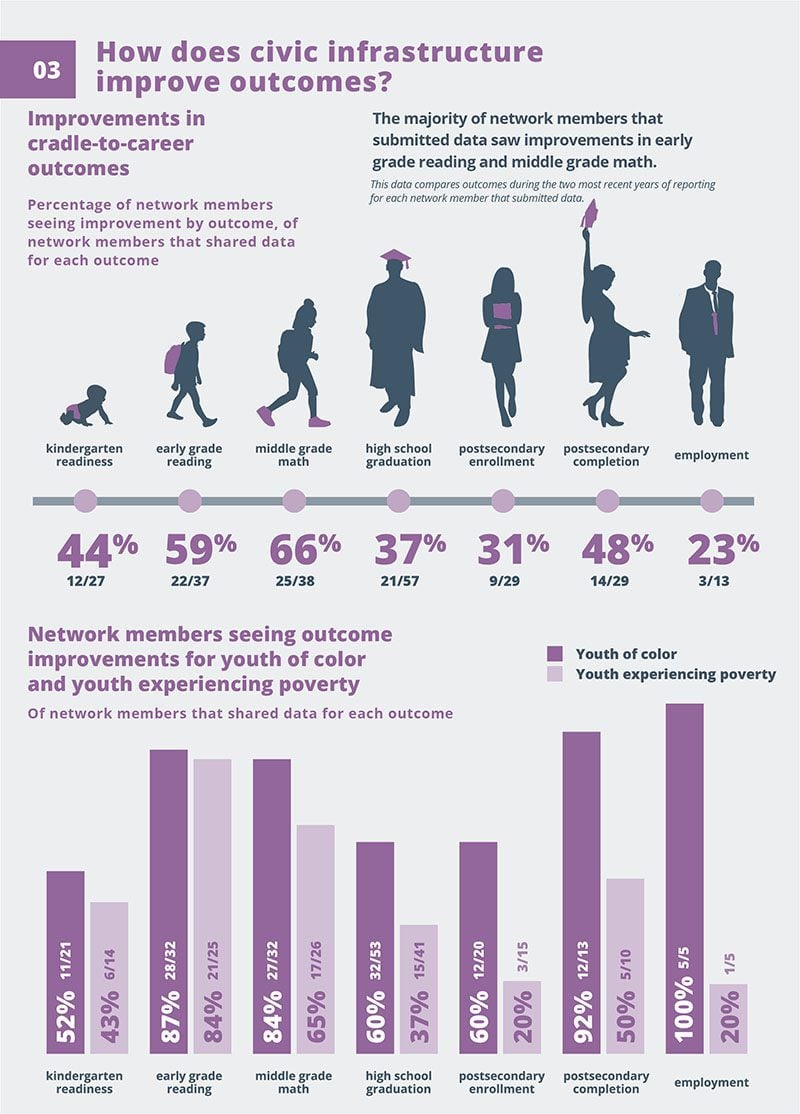
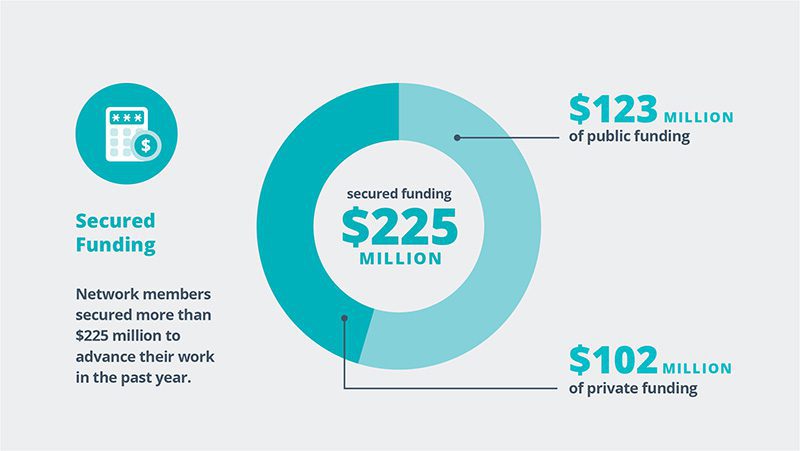
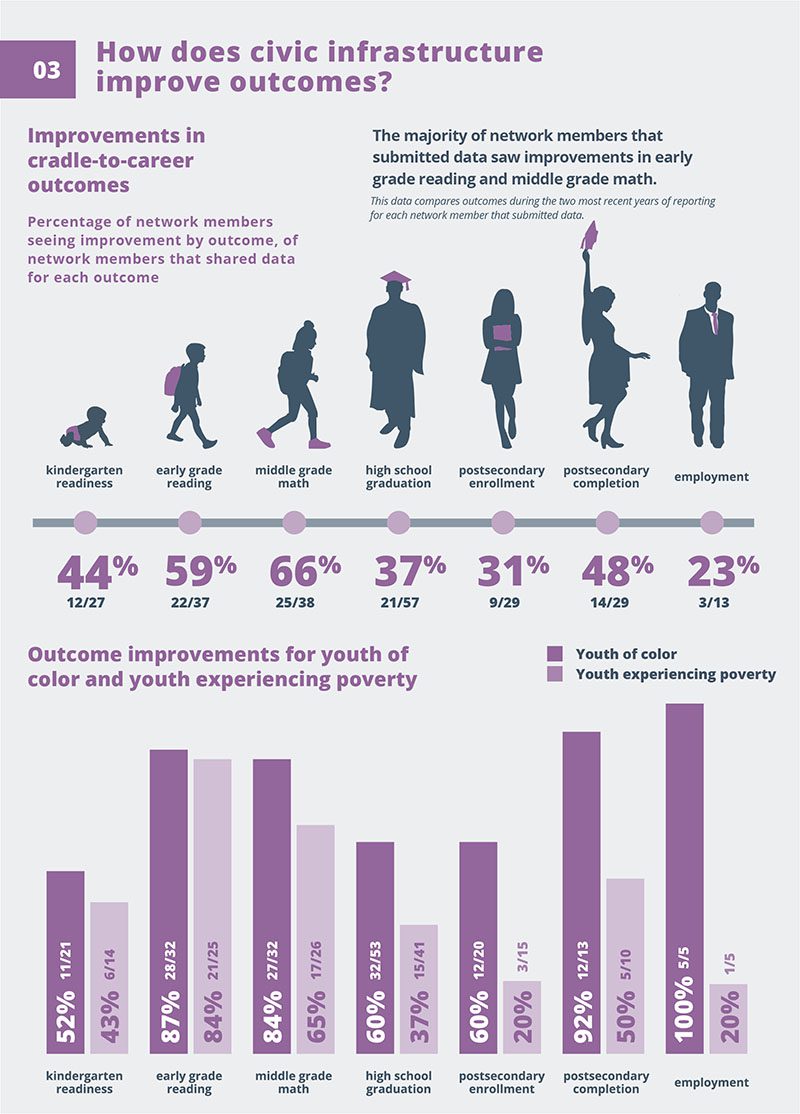
STORIES FROM THE NETWORK: OHIO, CALIFORNIA AND TEXAS
Bouncing Back from the Pandemic
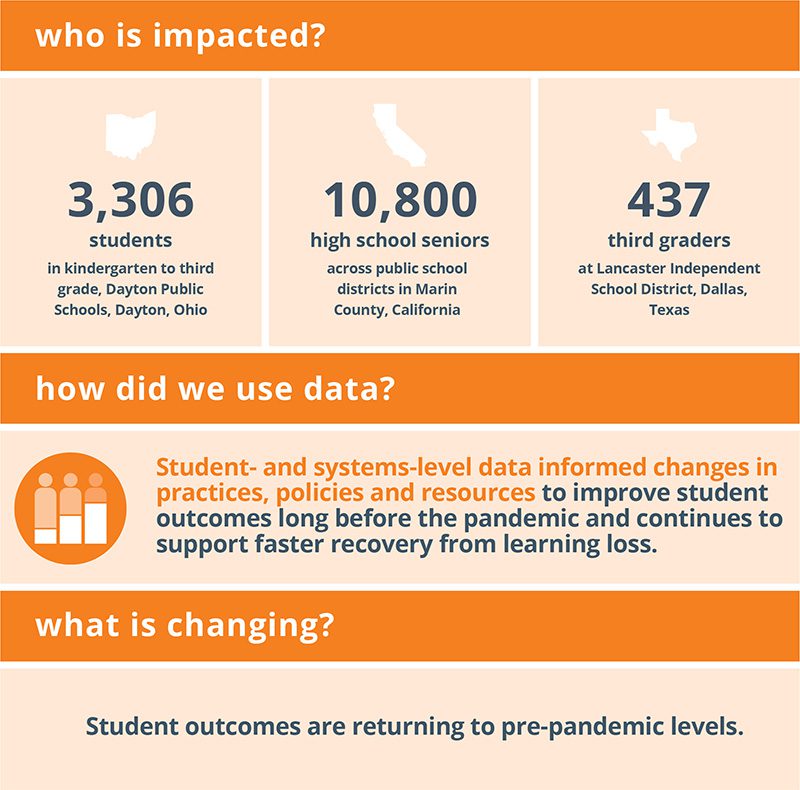
StriveTogether Cradle to Career Network communities have been working to get better, more equitable outcomes for young people since before the pandemic disrupted learning for students across the country.
This groundwork is the reason we are seeing cradle-to-career outcomes that have already bounced back to pre-pandemic levels — despite an estimate by the Northwest Evaluation Association that it may take students three to five years to recover from the pandemic.
Students in network communities that prioritize transforming systemic inequities in education are seeing results. The time spent building strong civic infrastructure — including relationships, collaboration, goal setting and data sharing — helped these communities access opportunities in an especially disparate climate.
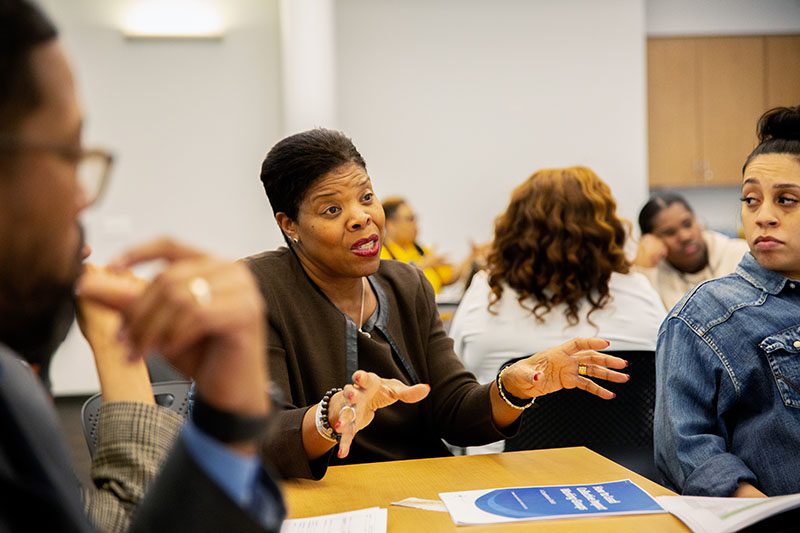
Learn to Earn Dayton achieved results that increased momentum for public investment in Preschool Promise to help more children enter kindergarten ready to learn. Kindergarten readiness went up nearly 5 percentage points in the county, compared to less than 1 percentage point statewide.
As schools shifted to remote learning during the pandemic, math and reading scores plummeted. Learn to Earn Dayton and Dayton Public Schools leveraged a long-standing relationship built upon trust and collaboration to quickly devise a strategy addressing learning loss. A dual-teaching model for grades K-3 was implemented, with one teacher focused on literacy and one teacher focused on numeracy.
In just one school year, early grade reading scores increased by 12 percentage points for all students during the 2021-22 school year and 15 and 14 percentage points for Black students and those experiencing poverty. Kindergarten student math scores improved an average of 22 points over the prior and pandemic-impacted year. Second- and third-grade math scores improved dramatically, with the average growth surpassing projections based on national norms.
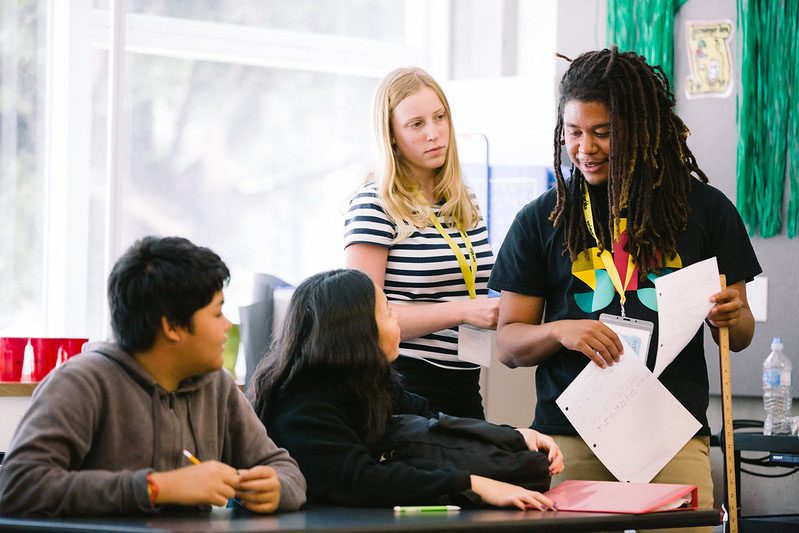
Ten years ago, community members decided to change fragmented, inequitably distributed educational opportunities for their children. Today, California’s Marin County has strong civic infrastructure. More than 100 youth and family leaders, community-based organizations, public institutions and funders have come together to advance educational equity.
As part of the Cradle to Career Network, Marin Promise Partnership learned how to use results-based facilitation and collaborative improvement. Through this approach, partners work together to build capacity across local networks, focused on a shared cradle-to-career vision.
This vision includes working across the county to ensure students are ready for their future in college, career and beyond. School and community partners reviewed academic, social and emotional student-level data monthly and integrated their efforts with other school-based services. This strategy expanded the scope of Success Networks working on college readiness from 100 students on one school campus to more than 1,000 students on three campuses.
As Success Networks matured on each campus, the work became embedded in the school system, facilitated by intervention program coordinators at each site. The Partnership staff shifted from facilitating the Success Networks to providing training, weekly coaching and data support. Data-sharing agreements and automated data dashboards kept everyone focused on progress.
This data shaped practice and policy changes in 2019 to ensure high school students completed foundational coursework for postsecondary enrollment. Recommendations were institutionalized by districts during the 2020-21 school year.
Before the pandemic, college and career readiness rates had been steadily improving from 56% to 71% for all students in Marin and 42% to 54% for students of color. During the pandemic, these rates only fell by 6% (all students) and 5% (students of color) and quickly rebounded back to or above pre-pandemic levels in the 2020-21 school year. Marin County college readiness has surpassed the state average of 50% and 51% respectively.
Marin Promise Partnership credits these results to having institutionalized the infrastructure to support Success Networks before the pandemic so that strong relationships were in place to help the school system pivot as one during the pandemic recovery.
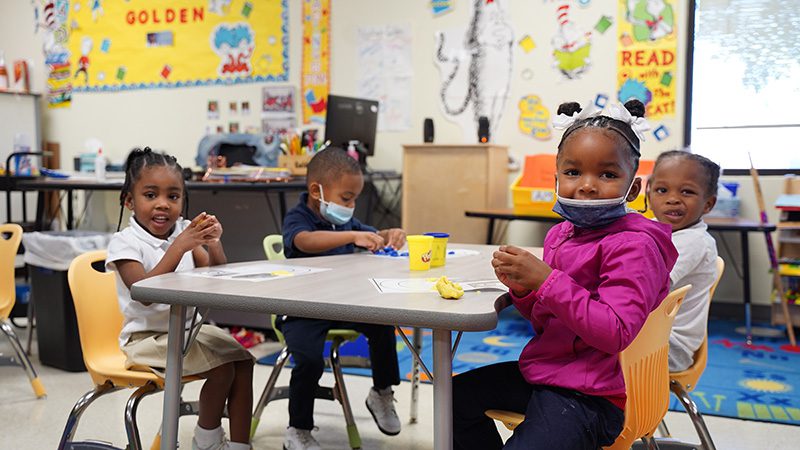
Before the pandemic, the Commit Partnership in Dallas County advocated with other cradle-to-career communities for a new state policy requiring that all K-3 and full-day pre-K educators receive training on how to teach reading.
The region lost a decade of learning during the pandemic. However, third-grade reading in one district, Lancaster Independent School District, improved by eight points from 37% in 2019 to 45% in 2022. This is compared to a 41% to 43% increase in Dallas County and a 43% to 50% increase across the state.
Despite having the highest rate of students experiencing economic disadvantage in their county, teachers and students in Lancaster achieved the biggest gain in reading versus peers because of the district’s focus on increasing pre-K enrollment. Lancaster had been one of the first school districts in Dallas County to offer both 3- and 4-year-old pre-K.
Nearly every third grader in the class of 2022 had been enrolled in Lancaster’s pre-K program as a 4-year-old. This enrollment is far above the state average. School leaders credit improved student outcomes to the emphasis on early childhood education, centralized learning recovery lessons and the investment in reading. The Commit Partnership provided data to help Lancaster schools understand student progress and is now working with 15 neighboring districts to use data-driven strategies to increase pre-K enrollment.
The success seen in these communities is just a slice of the impact network members are having across the country. Investing in civic infrastructure is working to get more young people better opportunities, faster.
STORIES FROM THE NETWORK: ADAMS COUNTY, COLORADO
Young Leaders Making an Impact
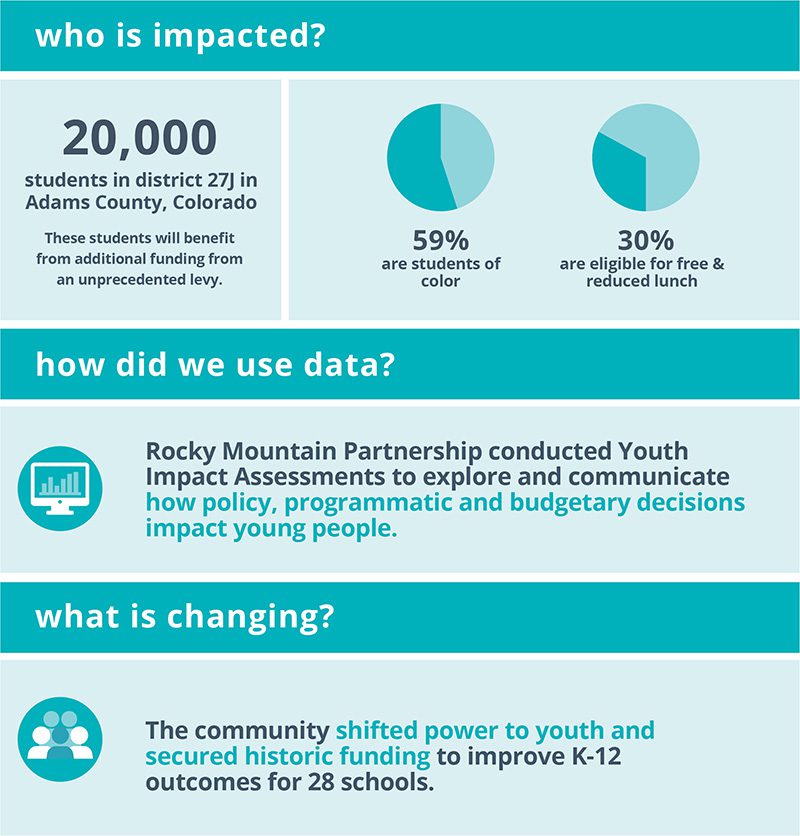
Transformative change centers the voice of community members and spotlights emerging leadership.
In Adams County, Colorado, Cradle to Career Network member Rocky Mountain Partnership is making a profound impact on K-12 outcomes by building civic infrastructure with a coalition of youth and community members.
The community’s school district, 27J, was the third least funded in the state, and efforts to secure funding failed seven times. Something needed to change. So, Rocky Mountain Partnership mobilized a community-led coalition of “Civic Influencers” to work in partnership with the “I am 27J” campaign committee in educating and advocating for voters to pass a critical mill levy override. Most of the civic influencers were students living in the community. Together, they connected with over 900 community members at more than 20 community meetings and events.
The power of these civic influencers became clear in November 2022, when 27J Schools successfully passed this mill levy override — its first in over two decades. This funding will impact 20,000 students enrolled in 28 schools, 59% of whom are students of color and 30% of whom are free and reduced lunch eligible. It supports school safety, career development and increased pay for teachers.
“We were the missing piece to bridge community and district voice,” notes Gabriela Chavez, another civic influencer and 27J alumna.
“A lot of our job was explaining the importance of the levy, as a fellow community member. To be able to share that lived experience was very valuable.”
StriveTogether helped Rocky Mountain Partnership by providing the resources and technical assistance needed to engage the community in an authentic and effective way.
The network member is one of eight communities in a multiyear initiative called SPARCY: Shifting Public Accountability and Resources to Center Youth. A key component of SPARCY includes Youth Impact Assessments, which explore how policy, programmatic and budgetary decisions impact young people to get to more targeted strategies. This data was used to support more effective communication and community engagement efforts by providing the most relevant information to the people impacted.
Lisandra Gonzales, chief executive officer at Rocky Mountain Partnership, says, “I can’t say enough about the role that StriveTogether played. From funding to technical assistance with the impact analysis shared with community members, they helped us connect with the right resources to really make the case on the ground.”
To properly develop the Community Coalition, Rocky Mountain Partnership evolved internal systems to have the ability to compensate community members as they would experts. Creating an official leadership table established formal authority for community members with paid roles, like their community leaders table.
The “I am 27J” campaign rallied the community to pass the levy with 57% of the vote, despite strong opposition and a long history of previous failed attempts. The work earned Rocky Mountain Partnership an important local distinction: the 2023 27J Schools Believer Award from the Board of Education. Passage of the mill levy override was the first focus for Rocky Mountain Partnership’s civic influencers, and it won’t be the last. Influencers continue to identify other opportunities to close equity gaps across the community.
The success of the ballot measure is scaling across the state with other school districts considering a similar approach for their own ballot measures and capital campaigns. These organizations now seek consultation from the youth who serve with Rocky Mountain Partnership, empowering the new leadership model to grow.
STORIES FROM THE NETWORK: CENTRAL TEXAS
Transforming Systems with Data and Collaboration
STORIES FROM THE NETWORK: CENTRAL TEXAS
Transforming Systems with Data and Collaboration
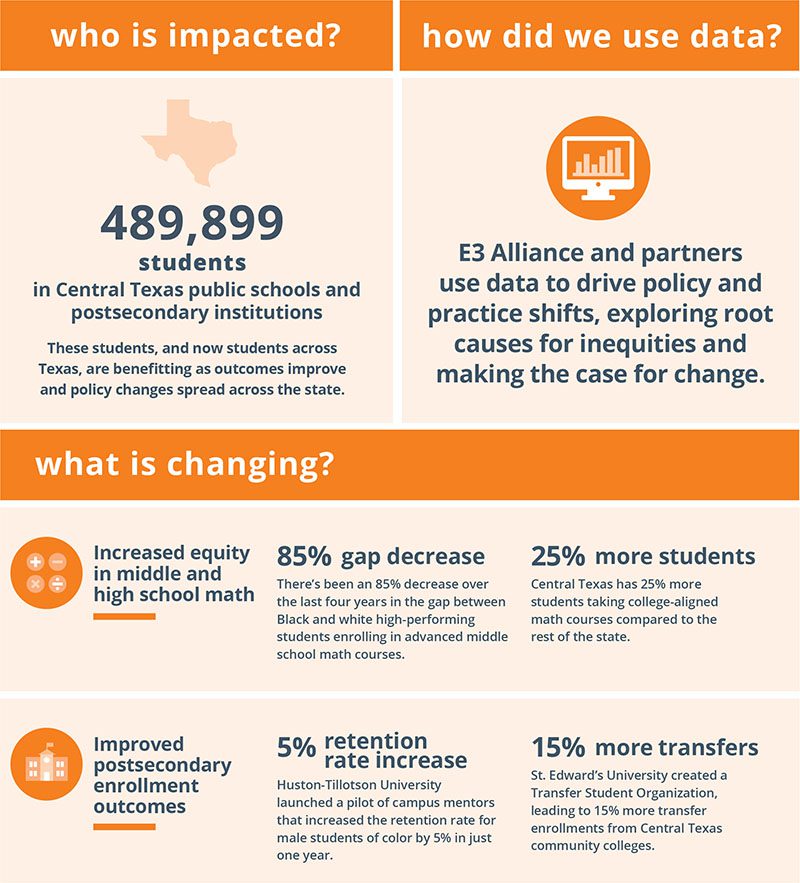
When communities transform systems, the changes endure political shifts and leadership transitions.
Lasting change means institutions redistribute resources to have the most impact, policymakers pass laws that get more equitable outcomes, and community members have the power to influence decisions that impact them.
“Systems transformation is understanding the root causes behind the barriers that stop our students, and doing so at a scale where hundreds of thousands of students have the opportunity to succeed,” shares Susan Dawson, president and executive director of E3 Alliance.
Since 2006, E3 Alliance has invested in civic infrastructure, connecting people, ideas and resources to make Central Texas stronger. This Cradle to Career Network member is transforming education systems using data and collaboration so every student can succeed. The team has worked with school districts, higher education institutions, businesses, nonprofits and policy leaders across the region and beyond. Now, their work has earned the Systems Transformation designation along the StriveTogether Theory of ActionTM.
E3 Alliance and their partners are building a future where every child in the region has equitable access to opportunities, from cradle to career. On that path, math success in middle and high school is the strongest predictor of postsecondary success and increased opportunity for economic mobility later in life.
Using data to support policy shifts has led to an 85% reduction in gaps between Black and white high-performing students enrolled in advanced middle school math courses over the last four years.
To turn these changes into transformation, E3 Alliance championed 12 districts to adopt equitable math policies, including:
- Automatically enrolling qualified students in advanced math classes.
- Connecting students across the region with high school math courses that support their college and career aspirations.
- Supporting high school and college advisors to align classes and advising to support student success.
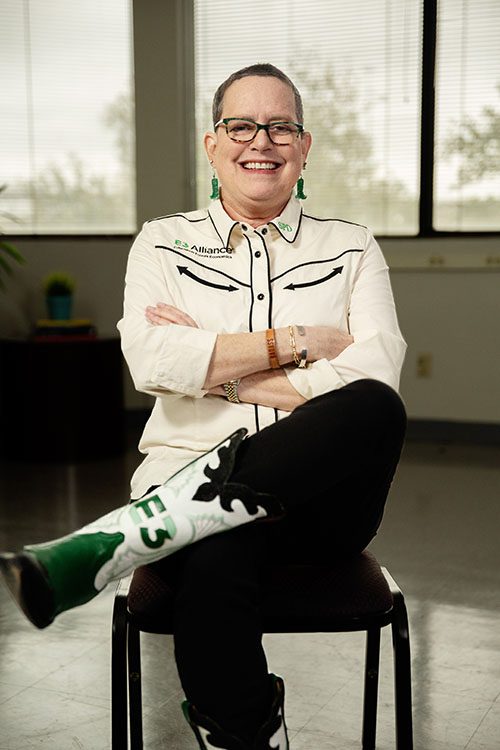
Since 2006, E3 Alliance has invested in civic infrastructure to make Central Texas stronger. The Cradle to Career Network member is led by President and Executive Director Susan Dawson, left.
Already, 25% more students in Central Texas are taking college-aligned math courses than across the state. This local work could lead to statewide transformation through proposed policy changes in the 2023 legislative session, potentially benefiting hundreds of thousands of students.
Continuing down the path to economic mobility, postsecondary success is critical.
E3 Alliance convenes representatives from five local postsecondary institutions through their Peer Learning Network to prioritize postsecondary success. The work is designed to improve outcomes, including transfer and retention rates for students of color and students experiencing poverty. The group receives coaching on setting goals, exploring data to identify root causes and test new strategies — with student feedback — to transform systems.
One partner, Huston-Tillotson University, identified inadequate advising staffing and support as a root cause of low student retention. They launched a pilot of campus mentors to provide students with more guidance and connections. This strategy helped Huston-Tillotson increase the retention rate for male students of color by 5% in just one year.
St. Edward’s University discovered that transfer students felt a lack of belonging and didn’t have a support system to navigate the differences between two- and four-year colleges. Students formed a Transfer Student Organization to recruit, welcome and support transfer students. Within one year, St. Edward’s increased transfer enrollments from Central Texas community colleges by 15%. This increase leads to improved postsecondary persistence and completion.
E3 Alliance’s work is making a transformative difference for students and families in Central Texas, and the impact is already spreading across the state. New policies, power structures and ways of working together support a brighter future for every child.
IMPACTING TOMORROW
additional resources
board of directors
The Board of Directors provides oversight and strong leadership to guide the organization in supporting the success of every child, cradle to career.
operating highlights
StriveTogether’s auditors have expressed an unqualified opinion on our financial statements for the fiscal year that ended on December 31, 2022.
investors and partners
Our work to ensure every child has every chance to succeed is made possible through the generous support of our investors and partners.
advance your work
StriveTogether provides training to help leaders strengthen their ability to work across sectors, change systems and achieve equitable outcomes.
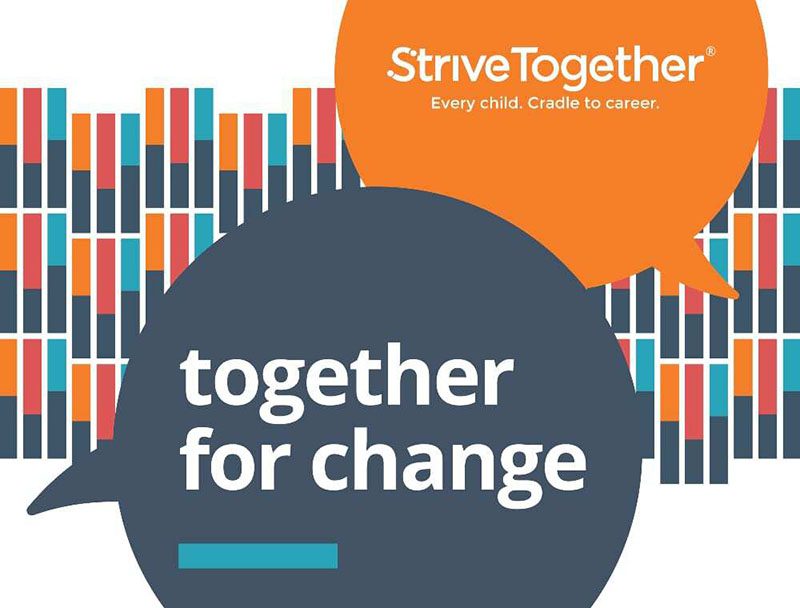
get new insights
Our Together for Change podcast features StriveTogether leaders and our partners from across the country in conversation about breaking down barriers and improving cradle-to-career outcomes.
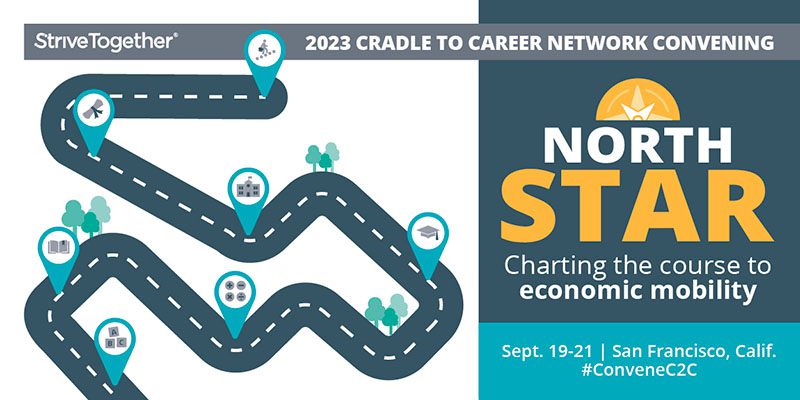
gather with changemakers
Join StriveTogether and changemakers from across the country at the Cradle to Career Network Convening, the only national event of its kind.

